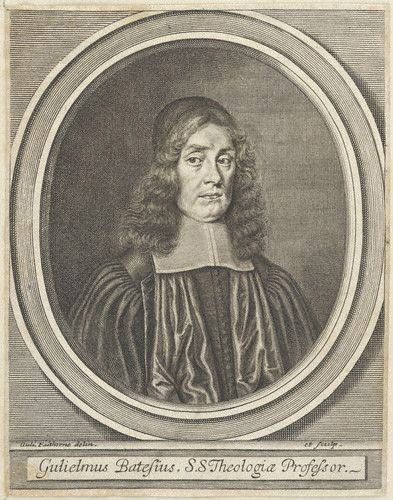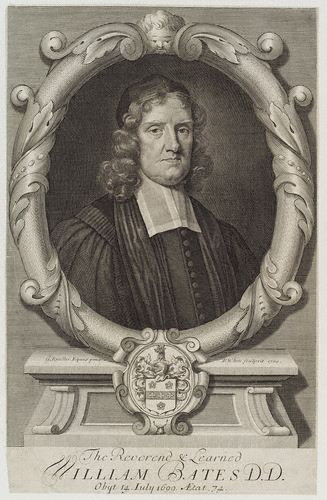William Bates (theologian) on:
[Wikipedia]
[Google]
[Amazon]
William Bates (1625–1699) was an English Presbyterian minister.

 His works issued were first collected in 1700. They include:
*''Harmony of the Divine Attributes'' (1697?)
**''Harmony of the Divine Attributes'' (1674)
**''Harmony of the Divine Attributes'' (1675)
**''Harmony of the Divine Attributes'' (1771)
**''Harmony of the Divine Attributes'' (1831)
**''The harmony of the divine attributes in the contrivance and accomplishment of mans redemption'' ( .d.
* ''Considerations on the Existence of God and Immortality of the Soul'' (1676).
* ''Four Last Things–Death, Judgment, Heaven, and Hell'' (1691, reprinted 1838).
* ''Sermons preach'd on Several Occasions'' (1693).
* ''Spiritual Perfection'' (1699).
* ''Vitae Selectorum aliquot Virorum qui doctrina, dignitate, aut pietate inclaruere'' (1681) Lives of famous divines in Latin.
*''The whole works of the Rev. W. Bates (IV volumes)'' (printed in 1815)
*Joint author of ''The Attributes of God'' (1835)
*A funeral-sermon for the Reverend, holy and excellent divine, Mr. Richard Baxter, who deceased Decemb. 8, 1691 : with an account of his life (1692)
*An account of the life and death of Mr. Philip Henry, minister of the gospel near Whitchurch in Shropshire, who died 24 June 1696, in the sixty fifth year of his age ; with Dr. Bates's dedication (1797).
His works issued were first collected in 1700. They include:
*''Harmony of the Divine Attributes'' (1697?)
**''Harmony of the Divine Attributes'' (1674)
**''Harmony of the Divine Attributes'' (1675)
**''Harmony of the Divine Attributes'' (1771)
**''Harmony of the Divine Attributes'' (1831)
**''The harmony of the divine attributes in the contrivance and accomplishment of mans redemption'' ( .d.
* ''Considerations on the Existence of God and Immortality of the Soul'' (1676).
* ''Four Last Things–Death, Judgment, Heaven, and Hell'' (1691, reprinted 1838).
* ''Sermons preach'd on Several Occasions'' (1693).
* ''Spiritual Perfection'' (1699).
* ''Vitae Selectorum aliquot Virorum qui doctrina, dignitate, aut pietate inclaruere'' (1681) Lives of famous divines in Latin.
*''The whole works of the Rev. W. Bates (IV volumes)'' (printed in 1815)
*Joint author of ''The Attributes of God'' (1835)
*A funeral-sermon for the Reverend, holy and excellent divine, Mr. Richard Baxter, who deceased Decemb. 8, 1691 : with an account of his life (1692)
*An account of the life and death of Mr. Philip Henry, minister of the gospel near Whitchurch in Shropshire, who died 24 June 1696, in the sixty fifth year of his age ; with Dr. Bates's dedication (1797).

Life
He was born in London in November 1625, and was educated at Cambridge, initially at Emmanuel College and subsequently (1644) atQueens' College
Queens' College is a constituent college of the University of Cambridge. Queens' is one of the oldest colleges of the university, founded in 1448 by Margaret of Anjou. The college spans the River Cam, colloquially referred to as the "light s ...
. In 1647 he proceeded B.A. He was a presbyterian. His first living was St. Dunstan's-in-the-West, London, and he remained as vicar until the Act of Uniformity 1662 was passed, when he was ejected. He also took part with other evangelical clergy in carrying on a lecture series in Cripplegate
Cripplegate was a gate in the London Wall which once enclosed the City of London.
The gate gave its name to the Cripplegate ward of the City which straddles the line of the former wall and gate, a line which continues to divide the ward into ...
church under the name of 'Morning Exercise.'
In the negotiations for the restoration of Charles II, Bates took part. Royal favour came to him, and he was appointed one of the royal chaplains. In 1660 he acted as one of the commissioners of the Savoy conference
The Savoy Conference of 1661 was a significant liturgical discussion that took place, after the Restoration of Charles II, in an attempt to effect a reconciliation within the Church of England.
Proceedings
It was convened by Gilbert Sheldo ...
. In 1661 Cambridge conferred on him the degree of D.D. by royal mandate. At the same time he was urged to accept the deanery of Lichfield and Coventry, but like Richard Baxter
Richard Baxter (12 November 1615 – 8 December 1691) was an English Puritan church leader, poet, hymnodist, theologian, and controversialist. Dean Stanley called him "the chief of English Protestant Schoolmen". After some false starts, he ...
, Edmund Calamy the elder
Edmund Calamy (February 160029 October 1666) was an English Presbyterian church leader and divine. Known as "the elder", he was the first of four generations of nonconformist ministers bearing the same name.
Early life
The Calamy family claimed ...
, Thomas Manton
Thomas Manton (1620–1677) was an English Puritan clergyman. He was a clerk to the Westminster Assembly and a chaplain to Oliver Cromwell.
Early life
Thomas Manton was baptised 31 March 1620 at Lydeard St Lawrence, Somerset, a remote sou ...
, and others in their position, he declined office. Later, Bates conducted the discussion between the nonconformists and John Pearson, Peter Gunning
Peter Gunning (1614 – 6 July 1684) was an English Royalist church leader, Bishop of Chichester and Bishop of Ely.
Life
He was born at Hoo St Werburgh, in Kent, and educated at The King's School, Canterbury and Clare College, Cambridge, wher ...
, and Anthony Sparrow
Anthony Sparrow (1612–1685) was an English Anglican priest. He was Bishop of Norwich and Bishop of Exeter.
Career
Born in 1612, Sparrow was educated and became a fellow at Queens' College, Cambridge, and was ordained a priest in February 1 ...
. In 1665 Bates took the oath imposed by the parliament which met at Oxford 'that he would not at any time endeavour an alteration in the government of church or state.' In this he was supported by John Howe and Matthew Poole
Matthew Poole (1624–1679) was an English Non-conformist theologian and biblical commentator.
Life to 1662
He was born at York, the son of Francis Pole, but he spelled his name Poole, and in Latin Polus; his mother was a daughter of Alderman T ...
, although Richard Baxter refused it.
In 1668 some of the more moderate churchmen endeavoured to work out a scheme of comprehension that would bring presbyterians back into the Church of England
The Church of England (C of E) is the established Christian church in England and the mother church of the international Anglican Communion. It traces its history to the Christian church recorded as existing in the Roman province of Britai ...
. In this Bates, Baxter, and Manton co-operated. But no agreement could be reached. A little later he joined in the presentation of a petition to the king for 'relief of nonconformists'; the king received him graciously, but nothing came of it. Again in 1674, under the conduct of John Tillotson
John Tillotson (October 1630 – 22 November 1694) was the Anglican Archbishop of Canterbury from 1691 to 1694.
Curate and rector
Tillotson was the son of a Puritan clothier at Haughend, Sowerby, Yorkshire. Little is known of his early youth ...
and Edward Stillingfleet
Edward Stillingfleet (17 April 1635 – 27 March 1699) was a British Christian theologian and scholar. Considered an outstanding preacher as well as a strong polemical writer defending Anglicanism, Stillingfleet was known as "the beauty of holin ...
, a fresh effort was made towards comprehension through Bates, but once more nothing came of it. After the accession of James II, the disabilities and sufferings of the nonconformists increased. Bates was at Baxter's side when George Jeffreys browbeat and insulted Baxter and his associates. He successfully interceded with Archbishop Tillotson in behalf of Nathaniel, Lord Crewe, bishop of Durham, who had been excepted from the act of indemnity of 1690.
Bates delivered two speeches to William III and Mary on their accession on behalf of the dissenters. In the last years of his life he was pastor of the Presbyterian church of Hackney; he died there on 14 July 1699, aged seventy-four, having outlived and preached the funeral sermons of Baxter, Manton, Thomas Jacomb, and David Clarkson. As a preacher he was held to be 'silver-tongued' and the 'politest' of all the nonconformists.
John Howe's funeral sermon to Bates's memory was printed with Bates's works.
Works
 His works issued were first collected in 1700. They include:
*''Harmony of the Divine Attributes'' (1697?)
**''Harmony of the Divine Attributes'' (1674)
**''Harmony of the Divine Attributes'' (1675)
**''Harmony of the Divine Attributes'' (1771)
**''Harmony of the Divine Attributes'' (1831)
**''The harmony of the divine attributes in the contrivance and accomplishment of mans redemption'' ( .d.
* ''Considerations on the Existence of God and Immortality of the Soul'' (1676).
* ''Four Last Things–Death, Judgment, Heaven, and Hell'' (1691, reprinted 1838).
* ''Sermons preach'd on Several Occasions'' (1693).
* ''Spiritual Perfection'' (1699).
* ''Vitae Selectorum aliquot Virorum qui doctrina, dignitate, aut pietate inclaruere'' (1681) Lives of famous divines in Latin.
*''The whole works of the Rev. W. Bates (IV volumes)'' (printed in 1815)
*Joint author of ''The Attributes of God'' (1835)
*A funeral-sermon for the Reverend, holy and excellent divine, Mr. Richard Baxter, who deceased Decemb. 8, 1691 : with an account of his life (1692)
*An account of the life and death of Mr. Philip Henry, minister of the gospel near Whitchurch in Shropshire, who died 24 June 1696, in the sixty fifth year of his age ; with Dr. Bates's dedication (1797).
His works issued were first collected in 1700. They include:
*''Harmony of the Divine Attributes'' (1697?)
**''Harmony of the Divine Attributes'' (1674)
**''Harmony of the Divine Attributes'' (1675)
**''Harmony of the Divine Attributes'' (1771)
**''Harmony of the Divine Attributes'' (1831)
**''The harmony of the divine attributes in the contrivance and accomplishment of mans redemption'' ( .d.
* ''Considerations on the Existence of God and Immortality of the Soul'' (1676).
* ''Four Last Things–Death, Judgment, Heaven, and Hell'' (1691, reprinted 1838).
* ''Sermons preach'd on Several Occasions'' (1693).
* ''Spiritual Perfection'' (1699).
* ''Vitae Selectorum aliquot Virorum qui doctrina, dignitate, aut pietate inclaruere'' (1681) Lives of famous divines in Latin.
*''The whole works of the Rev. W. Bates (IV volumes)'' (printed in 1815)
*Joint author of ''The Attributes of God'' (1835)
*A funeral-sermon for the Reverend, holy and excellent divine, Mr. Richard Baxter, who deceased Decemb. 8, 1691 : with an account of his life (1692)
*An account of the life and death of Mr. Philip Henry, minister of the gospel near Whitchurch in Shropshire, who died 24 June 1696, in the sixty fifth year of his age ; with Dr. Bates's dedication (1797).
Notes
References
* *External links
* * (a site dedicated to William Bates with many of his works) {{DEFAULTSORT:Bates, William 1625 births 1699 deaths English Presbyterian ministers of the Interregnum (England) Participants in the Savoy Conference Ejected English ministers of 1662 Alumni of Queens' College, Cambridge 17th-century Calvinist and Reformed ministers